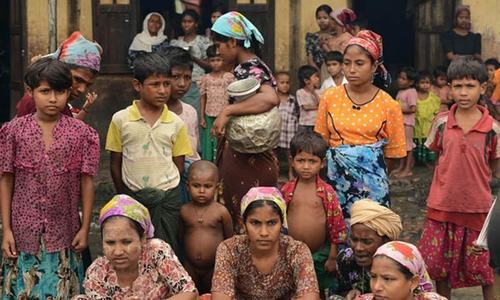YANGON: If there’s one thing that unites Aung San Suu Kyi’s party, the army that once tried to crush her, and the majority of people in mostly Buddhist Myanmar, it is their vehement dislike of the Rohingya Muslims, seen as a threat to national security.
“We don’t love the military, but we are together on this one,” said Nyan Win, a top official of Suu Kyi’s National League for Democracy (NLD), who the country’s former junta had detained for nearly three years. “Our sovereignty can’t be violated and that is why we are united.” “These people are illegal immigrants, that’s for sure. But the international community never mentions that,” said Nyan Win, 75, who chairs the ruling NLD’s media team and is one of the most influential members of the party.
But even as the United Nations has called the army crackdown on the Rohingya “ethnic cleansing”, western diplomats — from countries competing with China for influence in the Southeast Asian nation — say abandoning Suu Kyi or reimposing sanctions could risk Myanmar’s democratic transition.
Though Rohingya families have lived in Myanmar for generations, they are denied citizenship and access to basic civil rights such as freedom of movement, decent education and healthcare.
Attacks by Rohingya militants on security posts last month triggered an army operation that has killed more than 400 people, destroyed over 6,800 houses and sent nearly 400,000 Rohingya fleeing to Bangladesh.
Rohingya refugees and rights groups say the army has launched a campaign aimed at driving them out.
‘Fake news’
Suu Kyi, who holds the title of ‘State Counsellor’ and is de facto head of government, has said the militant Arakan Rohingya Salvation Army (ARSA) is responsible for the burning of homes, civilian deaths as well as “a huge iceberg of misinformation” on the strife in Rakhine.
Revered when she was under house arrest for some 15 years, the Nobel peace winner has been criticised by fellow Nobel laureates and some leaders across the world. A petition drive is under way to revoke her Nobel prize. Malala Yousafzai, a fellow Nobel Peace Prize laureate, called on her to condemn the “shameful” treatment of the Rohingya, saying “the world is waiting” for her to speak out.
“Shame on you Malala! You know nothing about real situation in our country,” Myanmar internet user Nann Wint War wrote in a tweet. “There is no Rohingya, only Bengali terrorists in Rakhine,” said the tweet, a reference to Rohingya that suggests they come from Bangladesh.
Suu Kyi’s government launched a media campaign aimed at shoring up public support for the operation.
In Facebook and Twitter posts, it has shown off support for non-Muslims displaced by the violence and blamed the international community for distributing “fake news” about alleged rights abuses.
“Hard Evidence Please!”, Suu Kyi’s spokesman, Zaw Htay, said in a tweet last week reacting to a BBC News report that Rakhine Buddhist villagers set Muslim houses on fire. “You wrote you just saw it, share your #Evidence.”
Aung Shin, an NLD spokesman, said only Myanmar citizens understand the situation in Rakhine as “foreign countries made their assumption based on questionable facts they obtained”.
Many in Myanmar fear the Rohingya present a threat to the Buddhist Rakhine majority in Rakhine State. Sixteen non-Muslims were killed and nearly 30,000 have also been displaced, fleeing to larger towns.
True guardians
The conflict in Rakhine has stoked communal tensions across the country. A mob armed with sticks and swords, threatening to attack a mosque in central Myanmar, was only dispersed on Sunday after police with riot shields fired rubber bullets. Muslims have voiced fear that other mosques will come under attack and have asked for tighter security.
Thiri Thant Mon, managing director at Yangon-based investment advisory firm Sandanila, said many in Myanmar think the international community has wrongly directed its attention to the Rohingya fleeing Myanmar, instead of the suffering of Rakhine Buddhists in one of its poorest states.
“The entire population here just feel misunderstood. They feel like we are not bad people. It’s not us, it’s them who are killing us and why aren’t you talking about it?” said Thiri Thant Mon, who herself does not identify with such views.
The Rohingya issue has put Suu Kyi in an awkward position politically, the diplomats said. The military still controls much of the state apparatus even after the 2011 transition to democracy. It portrays itself as the true guardians of nationalism and Buddhism. They say that could be a reason for Suu Kyi’s reticence.
“If she speaks out on such a sensitive issue, the situation will explode, making it harder for her to solve the problem in Rakhine,” said Nyan Win, the NLD executive.
“We can accept them as humans but we cannot let them move around freely, which violates our sovereignty,” he said, adding the Rohingya belong in camps for displaced people in Rakhine due to security reasons.
“We can’t give them freedom of movement because they are not our citizens.”—Reuters
Published in Dawn, September 15th, 2017













































